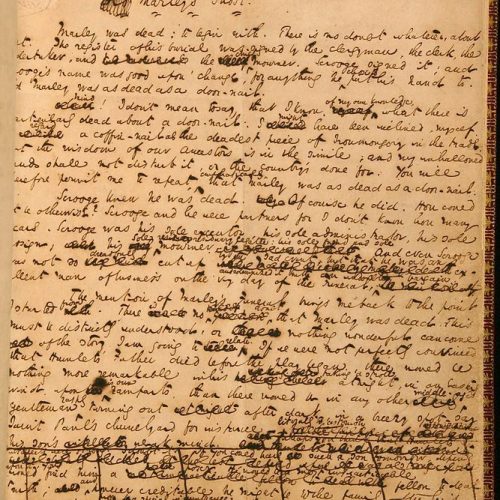Seen at the ferry landing on Orcas Island.
Dickens’s manuscript for A Christmas Carol. He strikes things out with curly-cues!
Some choice excerpts from The Elements of Style’s common misuses
Each and every one. Pitchman’s jargon. Avoid, except in dialogue.
Enormity. Use only in the sense of “monstrous wickedness.” Misleading, if not wrong, when used to express bigness.
Flammable. An oddity, chiefly useful in saving lives. The common word meaning “combustible” is inflammable. But some people are thrown off by the in– and think inflammable means “not combustible.” For this reason, trucks carrying gasoline or explosives are now marked FLAMMABLE. Unless you are operating such a truck and hence are concerned with the safety of children and illiterates, use inflammable.
In the last analysis. A bankrupt expression.
Lay. A transitive verb. Except in slang (“Let it lay”), do not misuse it for the intransitive verb lie. The hen, or the play, lays an egg; the llama lies down. The playwright went home and lay down.
Nauseous. Nauseated. The first means “sickening to contemplate”; the second means “sick at the stomach.” Do not, therefore, say, “I feel nauseous,” unless you are sure you have that effect on others.
Noun used as verb. Many nouns have lately been pressed into service as verbs. Not all are bad, but all are suspect.
People. The word people is best not used with words of number, in place of persons. If of “six people” five went away, how many people would be left? Answer: one people.
Prestigious. Often an adjective of last resort. It’s in the dictionary, but that doesn’t mean you have to use it.
Respective. Respectively. These words may usually be omitted with advantage.
The truth is… The fact is… A bad beginning for a sentence. If you feel you are possessed of the truth, or of the fact, simply state it. Do not give it advance billing.
Transpire. Not to be used in the sense of “happen,” “come to pass.” Many writers so use it (usually when groping toward imagined elegance), but their usage finds little support in the Latin “breathe across or through.” It is correct, however, in the sense of “become known.” “Eventually the grim account of his villainy transpired” (literally, leaked through or out).
-wise. Not to be used indiscriminately as a pseudosuffix: taxwise, pricewise, marriagewise, prosewise, saltwater taffywise. The sober writer will abstain from the use of this wild additive.
Oh dear, Hitchens really builds up a head of steam in this one. It starts out tame in the first part (above), but by the end he’s asking for a direct apology from the man on stage for being complicit in the deaths of millions by AIDS in Africa, and calling the clergy “a clutch of hysterical, cynical virgins.”
Out in the street it seemed to Rieux that the night was full of whispers. Somewhere in the black depths above the street-lamps there was a low soughing that brought to his mind that unseen flail threshing incessantly the languid air of which Paneloux had spoken.
Ignota navitas
Occulta Mors
from the grave of Kaspar Hauser
A Reader’s Manifesto
“People like Passaro, of course, tend to think that anyone indifferent to the latest "smart” authors must be vegetating in front of the television, or at best silently mouthing through a Tom Clancy thriller. The truth is that a lot of us are perfectly happy with literature written before we were born—and why shouldn’t we be? The notion that contemporary fiction possesses greater relevance for us because it talks of the Internet or supermodels or familiar brand names is ridiculous. We can see ourselves reflected more clearly in Balzac’s Parisians than in a modern American who goes into raptures when his daughter says ‘Toyota Celica’ in her sleep. This is not to say that traditional realism is the only valid approach to fiction. But today’s Serious Writers fail even on their own postmodern terms. They urge us to move beyond our old-fashioned preoccupation with content and plot, to focus on form instead—and then they subject us to the least-expressive form, the least-expressive sentences, in the history of the American novel.“
Absolutely.
The Lovely Feathers – “Photo Corners”
Hind Hind Legs
Got a new love for this album over the weekend, having usually turned it off after “Wrong Choice” for no particular reason and not getting a chance to love the later tracks. The half-major, half-minor singalong feel of this song is pretty unique to The Lovely Feathers. It’s like the best possible cross between the Libertines’ Up the Bracket and The Unicorns.




